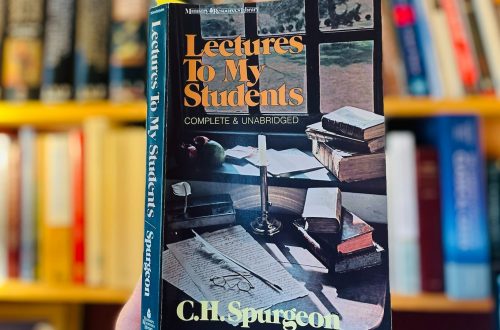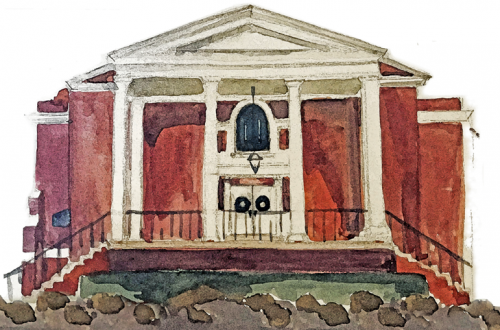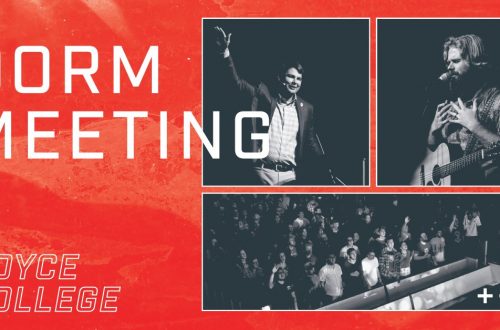At the annual meeting of the Evangelical Theological Society (ETS), members gather to discuss and debate papers that are presented by its various and sundry members. Oftentimes, the papers that are presented are rather unremarkable (like this one), but sometimes they are quite provocative (like this one). For those of us who like theological polemics, this is an exciting forum.
To be a member of the ETS one only has to affirm a two part doctrinal statement: (1) a belief in the inerrancy of Scripture, and (2) a belief in the Trinity. Thus, the membership is comprised of men and women from various evangelical and Protestant denominations who are for the most part on the conservative end of the theological spectrum.
Recent meetings of the ETS have seen much controversy over the issue of Open Theism. Open Theism says that human free-will is not really free if God already knows the future choices that people will make. So Open Theists deny that God has omniscient foreknowledge of the future.
The Open Theism controversy in the ETS has centered on the membership qualifications of two prominent proponents Open Theism. These two members, Clark Pinnock and John Sanders, have argued in favor of the Open Theism position in their published works. Roger Nicole, therefore, challenged the membership credentials of Pinnock and Sanders by claiming that their Open Theism is incompatible with the doctrine of inerrancy, a doctrine that every member of the ETS must affirm.
Pinnock and Sanders responded to these charges by maintaining that they affirm inerrancy, even though they do not affirm the exhaustive foreknowledge of God. In the end, Roger Nicole’s membership challenge of Pinnock and Sanders did not pass, and both men remain members of the ETS today (source).
This failed membership challenge has resulted in an effort by some to define what inerrancy means. In November 2004, the ETS Executive Committee unanimously recommended a resolution that was intended to clarify what the doctrinal basis means by the word “inerrant.†The membership passed the following resolution with 80% in favor and 20% opposed:
For the purpose of advising members regarding the intent and meaning of the reference to biblical inerrancy in the ETS Doctrinal Basis, the Society refers members to the Chicago Statement on Biblical Inerrancy (1978). The case for biblical inerrancy rests on the absolute trustworthiness of God and Scripture’s testimony to itself. A proper understanding of inerrancy takes into account the language, genres, and intent of Scripture. We reject approaches to Scripture that deny that biblical truth claims are grounded in reality (source).
At this year’s meeting, the members will vote whether to amend the bi-laws so that the Chicago Statement on Biblical Inerrancy will become the norm for defining inerrancy in the ETS. If this motion passes, then the ETS will have an official guideline for evaluating whether theological views (like Open Theism) are compatible with a belief in inerrancy.
The vote is Wednesday night, and I will be there voting in favor of the amendment.




10 Comments
jason allen
I’ve attended the ETS annual meeting several times in the past and for the first time I’m traveling to attend SBL (not ETS) this year.
With your post it made me think of a question I’ve had in the past, maybe you can shed some light on it. What do the members of SBL think about ETS? I know there is some overlap b/t the two but more the most part this doesn’t seem to be the case.
Any thoughts on that?
Ben
At the time of the open theism controversy, I was a student of the president of ETS. He was very troubled by the controversy, and occassionally read emails he had recieved to my class (with names removed, of course). The vitriol and venom in these letters was unmistakably UNchristian, and it has colored by view of the ETS ever since.
I find it interesting that ETS is touted to be made up of “men and women from various evangelical and Protestant denominations who are for the most part on the conservative end of the theological spectrum.” The goal of the ETS is, of course, to encourage top-notch scholarship within the broad and diverse evangelical realm.
However, instead of these scholars coming to the ETS to form and reform what evangalical thinking looks like without fear of retaliation, the more vocal members of the community are trying to set an exclusionary rule by setting the parameters of “evangelicalism” – which should instead be a dynamic construct continually defined by the very memebers of the community.
Anyone who thinks that passing this resolution is going to stop a competent scholar from publishing an exploration of hard theological questions (such as sovereignty vs free will) in such a way that challenges static evangelical formulations has not paid much attention to church history. They’ll simply find a less exclusionary peer-reviewed place to do it.
If the resolution passes, those who voted for the resolution will get warm and cozy, insulated from the more challenging questions and radical solutions generated by the best evangelical Christian thinkers of our time.
To me, this resolution is the ETS equivalent of killing the prophets.
dennyrburk
Jason, I don’t think the folks at SBL think about us much at all. To many of them, a society that subscribes to inerrancy is about as retrograde as one can get.
Ben, do you think that the ETS should have any doctrinal basis?
jason allen
Spinning off of what Ben said, what is the purpose of ETS? I’m sure I’ve read a statement in the past but it probably has a lot to do with Ben’s question and one that I often have. It seems to me we who claim evangelicalism have a tendency to address questions that have to do solely with insiders. I understand doctrinal purity and the like, but while we are focusing our attention on insider issues there is a world unconcerned with that conversation.
Do you think there is any concern for these issues? Or am I really off base?
Brian W
I was a seminary student at Bethel Seminary during the height of the Openness debate. Of course, Greg Boyd was a teacher at Bethel College; Piper, a pastor in the BGC (Bethel’s “parent”). You can imagine what kind of atmosphere that presented.
I echo Ben’s comments. I’m certainly not an Open theists, but Boyd argues from scripture. Does he do exegetical gymnastics? Of course he does and his interpreting skills are not much to be desired. But inerrancy isn’t about one’s interpretation. Boyd believes in inerrancy. I also believe that Boyd correctly critiques some of the “classical” interpretations of scripture as well. Something no one ever brings up.
In the openness debate, the issue (in my opinion) is not about inerrancy. It may be for Pinnock, but not for open theism. Most members don’t have a problem with Greg Boyd’s view on inerrancy; they have a problem with his interpretation. And up until now, ETS has not restricted membership based on poor interpretation.
Paul Lamey
Brian W.,
You said, “Most members don’t have a problem with Greg Boyd’s view on inerrancy; they have a problem with his interpretation. And up until now, ETS has not restricted membership based on poor interpretation.”
Isn’t that a false dichotomy? To the contrary, one should render a right view of inerrancy through interpretation. How can you justifiably drive a wedge between such issues? Are there any “poor interpretations” that should be out of bounds for ETS yet within a framework of inerrancy? If there are any, would that not be inconsistent with what you stated here?
At any rate, the more disheartening aspect of ETS is its continued mistaken identity as something useful to the evangelical church at large. It remains an organization that is irrelevant to the average church member and even the average pastor. Former ETS President Wayne Grudem pointed this out in his Presidential address a few years ago as have others but few seem to have listened.
Ben
Denny asked: “Ben, do you think that the ETS should have any doctrinal basis?”
This is tricky to answer for at least two reasons.
One, I can’t tell if the question is baiting me, or if it is genuine. I choose to address it as a genuine question, though in either case, the question is loaded. I’ll put myself out there in hopes of generating dialogue, not criticism.
Two, because it immediately brings to mind the Emergent Village conversation/discussion about whether or not they should have a doctrinal statement. In my reply, I wish to not burden this conversation with the baggage of the emergent conversation, though there may be some overlap in what we say.
For the ETS, I believe that some doctrinal statements are acceptable, if not necessary. For instance, I LOVE the trinitarian statement. Let’s camp there for a moment.
What does trinitarian actually mean? How should we appropriate it in Christian life? What conceptual space does it open up for us to love God with our minds? To me, this is the role of the ETS, to answer these questions in an ever more robust and relevant fashion.
If one were to statically define what Trinitarian is over-against other definitions, then the discussion has become unnessessarily constrained, and it is the first step in driving the ETS into irrelevancy. The practical purpose of the ETS, in my view, is to define Trinity (for instance) in ways that encourage conversation across the broad spectrum of evangelical thought. In this way, we are as iron sharpening iron. For me, this definition should happen in literature and conversation, not in static doctrinal statements.
Turning to the inerrancy statement, a brief look at “inerrancy” on wikipedia shows many different ways one can affirm inerrancy. Within the ETS, let’s converse about the validity of these views without statically determining which one is best – in a similar fashion to how we should discuss the significance of the Trinity.
I could say more, especially about how disturbing it is for most evangelicals to live in the tension of ambiguous definitions, but I will refrain for now.
To sum up – I think doctrinal statements are fine. I also think definitions of those statements should be formed and reformed through the conversation of the community. In this case, I think affirming inerrancy doctinally is fine, but the definition of inerrancy should be continually defined in the community of the ETS via the literature and conferences.
Brian W
Paul,
I meant that someone could have an “approved” understanding and interpretation of inerrancy and a wretchedly poor understanding and interpreation of the incarnation or doctrine of sin or take your pick. My point is that Greg Boyd meets the “inerrancy” issue according to the language given by ETS. And by ETS’s own statements, he lives up to those standards.
I’m not so much making a point about the consistency of one’s position, I’m just stating that to remove a guy like Greg Boyd from fellowship, they either need to break their own policy or form a new one.
Amen to your last paragraph.
Paul Lamey
Thanks Brian, I see where you’re coming from.
David W. Bailey
I have recently published the authorized biography of Roger Nicole, entitled Speaking the Truth in Love: The Life and Legacy of Roger Nicole. It is available from Amazon, Barnes and Noble, or the publisher, Solid Ground Christian Books.